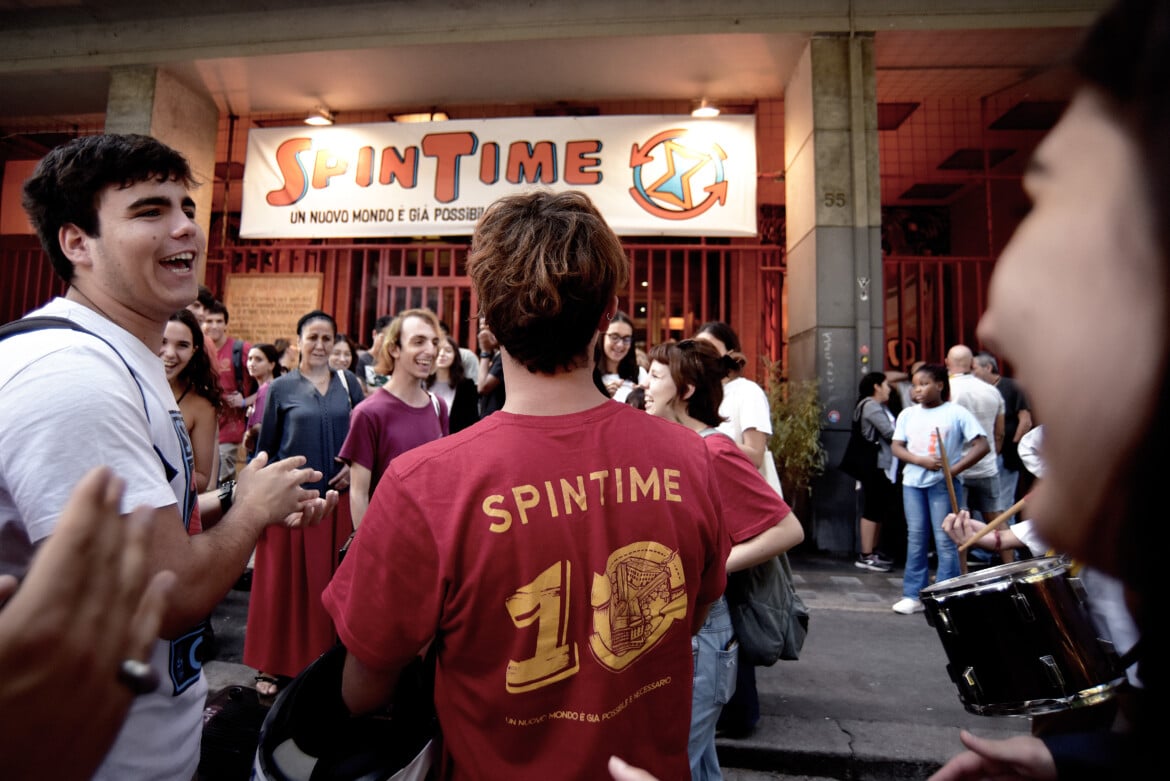Analysis
SpinTime’s Jubilee: The world’s popular movements converge on an occupied building
From October 21 to 24, the fifth World Meeting of Popular Movements meets in Rome. As a sign of convergence, the occasion will feature a march from St. Peter’s to SpinTime, a building in the Esquilino district that the right wing wants to evict.

Pope Francis has left behind a fruitful legacy: a veritable pacifist time bomb, aimed at unsettling those in power, and one that is likely already leading to more than a few headaches for the Meloni government and its crusades against dissent and grassroots activism.
From October 21 to 24, dozens of delegations from across the globe will arrive in Rome for the fifth World Meeting of Popular Movements, an event that originated in South America at the urging of then-Cardinal Bergoglio and has been global since 2014.
This edition is scheduled to tie in seamlessly with a Jubilee event for popular movements hosted by the Vatican over the following two days. As a sign of convergence, the occasion will feature a march that will connect St. Peter’s directly to an occupied building in the capital: the Encuentro will be hosted at SpinTime, a large, squatted building in the Esquilino district that the right wing wants to evict, particularly in the wake of its move against the Leoncavallo social center in Milan in late August.
The occupiers have been tasked with organizing the proceedings and guiding the discussions of the Meeting’s political committee, which is composed of Brazil’s Landless Workers' Movement, Argentina’s Union of Workers of the Popular Economy, Slum Dwellers International, the World Movement of Christian Workers, the PICO National Network from the United States, and Italy’s Mediterranea Saving Humans.
It was Francis who envisioned this evolution: after the first few years of Meetings organized directly by the Vatican, the movements would have to stand on their own two feet. “The first phase was important for getting popular movements recognized as protagonists in history. Now comes the second phase, where the movements organize themselves and build local and global networks, alliances, and collaborations. This was the idea from the very beginning,” says Don Mattia Ferrari, who is helping organize the event. We met him in a co-working room at SpinTime, along with a delegation of occupiers. In short, during the first decade the Church offered its political, cultural, and diplomatic umbrella to give visibility and legitimacy to certain groups – many of them secular, like SpinTime – in the name of a common interest in “integral human development,” while now it is urging them to establish independent forms of working together. The challenge, which will be a topic of discussion in Rome, is to create more stable forms of organization and relationships. “It’s about moving toward organizing a planet-wide alliance between popular movements,” a representative from SpinTime confirms. The hope is that this spirit will spread not only through global processes but also permeate Italian organizations. “We all have to break out of the bubbles we’ve built around ourselves,” says Andrea Alzetta, known as Tarzan. “We need a broad-based societal front before we get to the political one. Otherwise, the sovereignists will always win.”
In one of the documents inviting participants to the Meeting, SpinTime explains: “We believe that defeating the ‘religion’ of permanent global war and rearmament is possible. But to meet this challenge, new alliances are needed. To set sail for a different world, we must break down barriers and create new imaginaries by uniting secular and religious worlds to forge a common vision for radical change.” To the movements that define themselves by Pope Francis’s three T’s (Tierra, Techo, Trabajo – Land, Housing, Labor), SpinTime and the Italian group Mediterranea are proposing a focus on “the freedom of movement for people and new forms of municipalist and confederalist self-government.”
“One of the themes at the preparatory meeting in São Paulo, Brazil, which the Latin American groups attended, was the question of what space still remains for democracy in this current phase,” reflects Beatrice Tabacco, who traveled to South America in August to meet with some of the movements and invite them to Rome. This problem – of a conception of democracy and law which would be a match for the contemporary contradictions – intertwines with the work on a Constituent Assembly of the Earth advanced by Italian jurist Luigi Ferrajoli.
About 150 delegates will arrive from outside Europe, often accompanied by bishops or diocesan representatives with a focus on justice issues. Meanwhile, the Vatican’s diplomatic networks are at work trying to secure visas for all those coming from afar who are facing difficulties crossing borders. In total, there will be over one hundred delegations from movements around the world, with the goal of putting together a document that will be delivered to the Pope during the Jubilee days.
Don Mattia draws a diagram of concentric circles to describe the Meeting’s model for action. At the center are the popular movements; then come the churches and institutions – like the Municipality of Rome, which will collaborate in setting up the nearby Piazza Vittorio, where participants will gather each evening after the day’s work to meet with citizens and activists and share the substance of their discussions. It will be interesting, for example, to hear what African movements have to say about the Mattei Plan being pushed by the Italian government, or about the migration policies of “Fortress Europe.” And to figure out, together with Latin American activists, what can be done to stop corporate projects and the supranational processes that are harming the Global South. Naturally, it is hard to imagine how the government led by a self-proclaimed “woman, mother, and Christian” could ever resonate with any of these themes.
Originally published at https://ilmanifesto.it/il-giubileo-di-spintime-movimenti-mondiali-nel-palazzo-occupato on 2025-09-17
